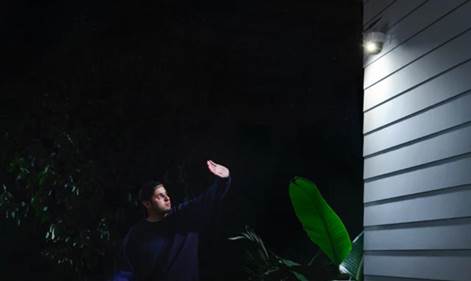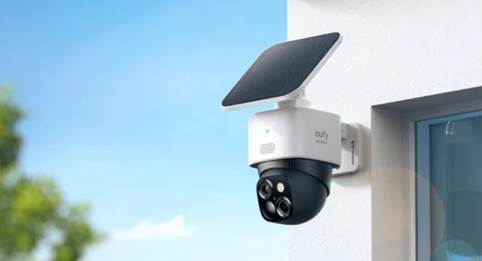At
first thought, it may seem impossible that a camera powered by sunlight
continues protecting your home once darkness falls. Yet solar security cameras
are designed precisely for this challenge, combining energy storage and smart
night vision technologies to ensure constant surveillance. A reliable system
doesn’t stop when the sun sets—it adapts. By storing energy during the day and
using specialized lenses and sensors at night, these cameras extend their
usefulness around the clock. Understanding how the solar security camera works helps you choose
equipment that never leaves your property unguarded, no matter the time of day
or the weather conditions.

How Power
Stays On When the Sun Goes Down?
The
foundation of solar security cameras is their ability to operate long after
daylight ends.
Battery
Storage Keeps Energy Flowing
During
daylight, the solar panel harvests energy and channels it into a built-in
rechargeable battery. That stored energy becomes the power source once night
arrives. Modern batteries are efficient enough to hold hours—or even days—of
reserve charge. This ensures the camera remains active through overcast
evenings or extended cloudy periods. The seamless handoff between solar input
and battery supply is what makes these cameras dependable guardians in the
dark.
Smart Power
Management Extends Runtime
Beyond
the battery, software plays a role in conserving energy. Intelligent power
management adjusts recording modes, balancing performance with efficiency. For
instance, the camera might prioritize motion-triggered recording over
continuous streaming during low activity hours, saving power for when it’s
needed most. This adaptability means the system doesn’t waste stored energy,
guaranteeing you coverage all night without interruption.
Solar Panels
Designed for Flexibility
Panel
design matters. Adjustable and removable solar panels allow users to capture
maximum sunlight even in shaded yards. By positioning the panel toward optimal
sun angles, the camera stores enough charge to last comfortably into the night.
This flexibility ensures that installation isn’t limited to wide-open areas but
works even in diverse home layouts where sunlight is partial.
How Cameras
See Clearly at Night?
Power
alone isn’t enough—night visibility depends on advanced imaging.
Infrared Night
Vision Reveals Hidden Details
Infrared
LEDs allow the camera to capture images even in complete darkness. While
invisible to the human eye, this light illuminates the scene for the camera’s
sensor, producing black-and-white footage rich with detail. You can see people,
vehicles, and motion around your property even when the streetlights are off.
Infrared technology ensures the system never goes blind once daylight fades.
Dual-Light
Systems for True Color Clarity
Some
advanced cameras take things further with dual-light night vision, combining
infrared with visible light for full-color images after sunset. This results in
sharper, more natural-looking footage, allowing you to identify clothing
colors, vehicle shades, and other key details that might otherwise be lost in
grayscale. Seeing in color at night enhances both awareness and the reliability
of recordings, should you need them later.
High-Resolution
Sensors That Don’t Compromise
Resolution
remains just as critical at night as during the day. A 3K or higher sensor
ensures that details remain sharp under low light. Combined with digital zoom,
you can focus on specific areas without losing clarity. This means you’re not
just aware of movement—you can distinguish who or what is moving, even from a
distance of several yards.
Why Continuous
Night Monitoring Matters?
Around-the-clock
reliability is what makes solar security cameras valuable.
Coverage
Through Every Season
Long
summer days make energy storage easier, but winter brings shorter daylight
hours. Reliable cameras are built to adapt, storing extra charge and using
efficient systems to stay active through seasonal changes. Knowing your home
remains protected regardless of the calendar makes year-round monitoring
stress-free.

Protecting All
Angles without Gaps
Blind
spots create vulnerabilities. A 360° pan-and-tilt camera ensures you never lose
coverage, whether during the day or at night. Instead of needing multiple
devices, one camera can sweep across a yard, follow motion, and zoom in when
necessary. By combining wide coverage with detailed viewing, the system works
as a complete nighttime solution rather than a partial fix.
Seamless
Integration into Daily Life
Reliability
is also about convenience. A system that stores video locally with instant
playback saves you from delays and recurring fees. The ability to access clear
night footage on demand makes it easier to check activity while traveling or
resting. When the technology fades into the background of daily life, always
working but never demanding attention, it demonstrates true reliability.
Conclusion
Solar
security cameras work at night by storing energy in rechargeable batteries
during the day and using advanced imaging technology after dark. Infrared
sensors provide clear black-and-white footage, while dual-light systems reveal
full-color details. Smart power management and adjustable panels ensure energy
lasts all night, even in less-than-ideal conditions. Features like 360°
coverage, high-resolution clarity, and dependable local storage make devices
such as the SoloCam S340 Wireless Outdoor Security Camera especially effective.
When placed strategically, security cameras powered by solar energy become
round-the-clock guardians, blending sustainable power with advanced night
vision to protect your home without compromise.
